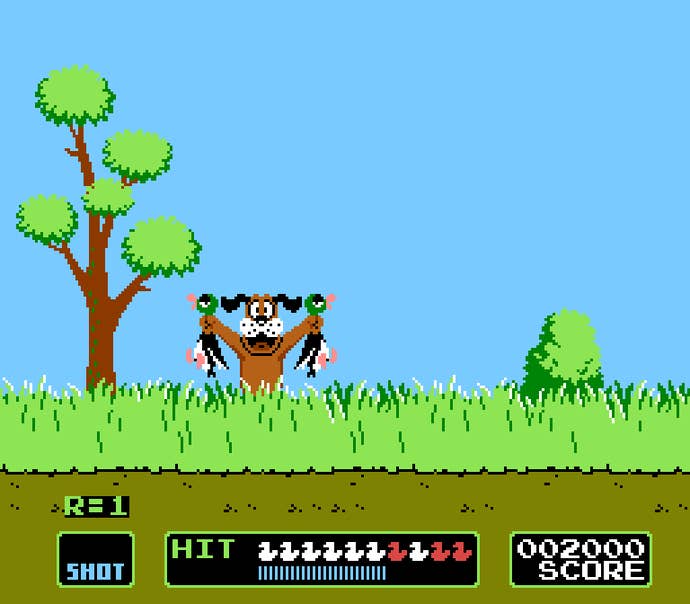Duck Hunt, the Template for Wii's Success
30 years ago, Nintendo's iconic sports shooter predicted the future.
This article first appeared on USgamer, a partner publication of VG247. Some content, such as this article, has been migrated to VG247 for posterity after USgamer's closure - but it has not been edited or further vetted by the VG247 team.
Back in the '80s, Nintendo quickly rose to the top once it entered the Japanese home market with Famicom. Yet they may never have been able to reproduce that success abroad if not for the presence of two famous peripherals: The Zapper light gun and R.O.B. the robot.
You should know the story by now: American retailers were burned out on games after taking huge losses in the wake of Atari's collapse, so Nintendo Trojan Horsed the NES into the market by presenting it as a toy, emphasizing its peripherals. The NES sold largely because of R.O.B.'s visual appeal and because Duck Hunt was deliriously fun.
Truth be told, it wasn't an entirely base deception. Sure, the games that made use of R.O.B. -- all two of them -- were pointless, and setting up the stupid robot in the first place was far more trouble than it was worth. But Duck Hunt, which shipped with NES bundles well into the system's stout middle age, was simple and addicting. Plus, it pretty much served as a perfect encapsulation of the Nintendo way of doing things. In fact, it effectively predicted how Nintendo would make its mark with the Wii more two decades later.
For starters, Duck Hunt was based on a vintage Nintendo game. This may sound strange -- as of 1984, the company had barely been in the video game business for half a decade -- but in fact the Duck Hunt brand predates Nintendo's video arcade business. Back in 1976, near the end of the company's run as a toy manufacturer, Nintendo created a standalone game called Duck Hunt, which projected images of ducks onto your wall and used a sensor in the gun barrel to register hits and misses.
Duck Hunt for NES takes this creative electronic devices and reinterprets it in video game form, in some cases almost literally: The video game's animation cycle (ducks fly at a roughly 45-degree angle and fall inverted to the ground upon being shot) is taken almost verbatim from the original. It's a remarkably faithful adaptation, in fact, but it's much more compact and convenient (not to mention colorful) in video game form. Much as the likes of Ultima made tabletop role-playing games much less cumbersome through digital automation, Duck Hunt for NES takes the whirring electromechanical noise out of the game and throws in little embellishments (some modest, like the backgrounds, and some memorable, like the sneering dog who mocks you for missing your targets).

Duck Hunt made a strong case for the NES as both toy and video game console, justifying the inclusion of a light gun with the system. Where R.O.B. was just a goofy waste of plastic, the Zapper -- paired with Duck Hunt -- made the NES memorable. For gamers who found the nuances of Super Mario Bros. too difficult to grasp, Duck Hunt's immediacy (you point and shoot at ducks with a gun, just like you would in real life) made it instantly relatable to everyone and helped the NES find acceptance that it might not otherwise have achieved with Mario alone.
Right here we see the formula Nintendo would use to conquer the world two decades later with Wii. The remote control-like stylings of the Wii's controller made it far more intuitive for general audiences than the competitions button-laden plastic bricks, and the simple, imitative design of Wii Sports offered a hook for grandma and grandpa to become hooked. And of course Nintendo would be nothing without its ability to dip into its back catalog and dredge up old concepts to refresh, just like they did back in 1984 with a clanky, decade-old electromechanical tabletop game. Some things never change.

